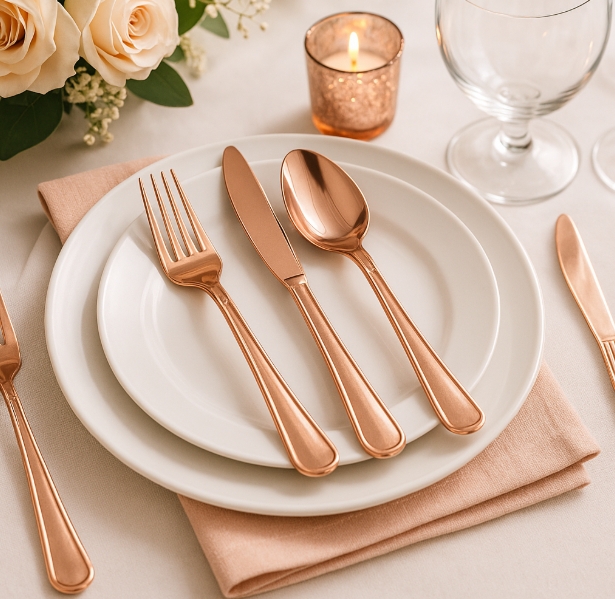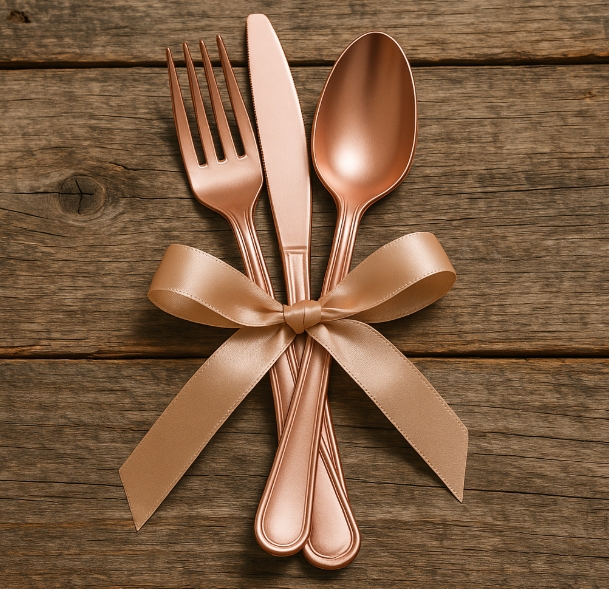
Content Menu
● Introduction to Disposable Cutlery in Arabia
● Market Overview and Key Trends
>> Rapid Growth and Diversification
>> Sustainability and Eco-Friendly Solutions
● Top Disposable Cutlery Manufacturers and Suppliers in Arabia
>> 1. Hotpack Packaging Industries LLC
>> 2. Napco National Packaging
>> 3. SAQR Pack
>> 4. Falcon Pack
>> 5. ENPI Group
>> 6. A1 Plast
>> 7. International Suppliers (China, Turkey, Others)
● Types of Disposable Cutlery and Materials
>> Material Options
>> Product Types
● The Manufacturing Process: From Raw Material to Finished Product
>> Plastic Cutlery Production
>> Wooden and Bamboo Cutlery Production
● How to Choose the Right Disposable Cutlery Supplier
>> 1. Material and Product Range
>> 2. Certifications and Compliance
>> 3. Customization Capabilities
>> 4. Production Capacity and Lead Time
>> 5. Sustainability Initiatives
>> 6. Pricing and Payment Terms
>> 7. Customer Support and Logistics
● The Future of Disposable Cutlery in Arabia
● Conclusion
● Frequently Asked Questions
>> 1. What is the most eco-friendly disposable cutlery material?
>> 2. Can disposable cutlery be reused?
>> 3. How do I ensure disposable cutlery can handle hot foods?
>> 4. Can I get custom-branded disposable cutlery?
>> 5. What is the typical minimum order quantity (MOQ) for bulk orders?
Disposable cutlery has become a cornerstone of the foodservice and hospitality industry in Arabia, where convenience, hygiene, and efficiency are paramount. As the region experiences rapid urbanization, a surge in tourism, and an ever-growing food delivery sector, the demand for high-quality disposable cutlery continues to rise. This article offers a comprehensive exploration of the top disposable cutlery manufacturers and suppliers in Arabia, delves into the latest trends, materials, and manufacturing processes, and provides actionable advice for businesses seeking reliable partners. Whether you are a brand owner, wholesaler, or producer, this guide is designed to help you navigate the dynamic market of disposable cutlery in Arabia.

Introduction to Disposable Cutlery in Arabia
Disposable cutlery refers to single-use utensils—such as forks, knives, spoons, and sporks—crafted from a variety of materials. These products are essential for quick-service restaurants, catering companies, food delivery services, and large-scale hospitality events. In Arabia, the market for disposable cutlery is shaped by a blend of local and international manufacturers, each offering unique solutions to meet the region's diverse needs.
The growing emphasis on hygiene, especially in the wake of global health concerns, has further accelerated the adoption of disposable cutlery. At the same time, environmental awareness and regulatory changes are driving innovation in sustainable materials and manufacturing practices.
Market Overview and Key Trends
Rapid Growth and Diversification
The Arabian disposable cutlery market is characterized by robust growth and diversification. Several factors contribute to this trend:
- Expansion of the Hospitality and Food Delivery Sectors: With the proliferation of restaurants, cafes, and catering services, the need for disposable cutlery has skyrocketed.
- Consumer Demand for Convenience: Modern lifestyles demand quick, hassle-free dining solutions, making disposable cutlery indispensable.
- Stringent Hygiene Standards: Post-pandemic, both consumers and businesses have heightened their focus on cleanliness and food safety, boosting the use of single-use utensils.
- Sustainability Concerns: As environmental regulations tighten, there is a clear shift toward eco-friendly and biodegradable alternatives.
Sustainability and Eco-Friendly Solutions
Sustainability has become a defining feature of the disposable cutlery market in Arabia. Manufacturers and suppliers are increasingly offering products made from:
- Biodegradable and Compostable Materials: Bamboo, wood, and bioplastics are gaining popularity as alternatives to traditional plastics.
- Recyclable Plastics: Some suppliers provide recyclable options to minimize environmental impact.
- Custom-Branded and Private-Label Packaging: To help businesses differentiate themselves, many manufacturers offer customizable packaging solutions.
Top Disposable Cutlery Manufacturers and Suppliers in Arabia
Arabia is home to a vibrant ecosystem of disposable cutlery manufacturers and suppliers, ranging from local enterprises to international exporters. Here are some of the leading players in the market:
1. Hotpack Packaging Industries LLC
Location: UAE and Saudi Arabia
Product Range: Comprehensive selection of disposable cutlery, including plastic, biodegradable, and wooden options.
Strengths: Advanced manufacturing facilities, wide distribution network, and a strong focus on sustainability and customization.
Notable Offerings: Heavy-duty, medium-duty, and eco-friendly cutlery sets, with options for custom branding.
2. Napco National Packaging
Location: Saudi Arabia
Product Range: Disposable cutlery, food containers, and packaging solutions.
Strengths: Local manufacturing, innovative recyclable and biodegradable products, and a robust distribution network.
3. SAQR Pack
Location: Saudi Arabia
Product Range: Disposable cutlery, plates, and food packaging.
Strengths: Comprehensive foodservice solutions, high-quality standards, and compliance with environmental regulations.
4. Falcon Pack
Location: UAE (with distribution across Arabia)
Product Range: Disposable cutlery, food packaging, and catering supplies.
Strengths: Diverse product range, strong presence in retail and wholesale markets, and a commitment to eco-friendly options.
5. ENPI Group
Location: UAE and Saudi Arabia
Product Range: Foodservice packaging, including disposable cutlery.
Strengths: Technological expertise, partnerships with international brands, and a focus on sustainable packaging innovations.
6. A1 Plast
Location: UAE
Product Range: Plastic disposable cutlery sets (forks, knives, spoons) and customizable kits.
Strengths: High-grade materials, heat resistance, custom logo printing, and eco-friendly initiatives.
7. International Suppliers (China, Turkey, Others)
- China: Renowned for its vast selection of disposable cutlery and robust OEM services, Chinese manufacturers are major exporters to the Arabian market.
- Turkey: Turkish suppliers are recognized for quality and competitive pricing, especially in plastic cutlery.
- Other Global Players: Companies such as Anchor Packaging, Dart Container, Genpak, and Hotpack Group also have a significant presence in the region.
Types of Disposable Cutlery and Materials
Material Options
The choice of material is a critical factor in disposable cutlery selection. Here are the most common options:
- Plastic (PP, PS): Lightweight, cost-effective, and durable, plastic cutlery remains popular for its versatility and affordability. However, environmental concerns have led to increased scrutiny and regulation.
- Wooden/Bamboo: Natural, compostable, and aesthetically pleasing, wooden and bamboo cutlery are favored for eco-conscious events and premium catering.
- Bioplastics (PLA): Made from plant-based sources, bioplastics are compostable in industrial facilities and offer a green alternative for regulated markets.
- Stainless Steel (Single-use): Occasionally used for upscale events, single-use stainless steel cutlery is recyclable and offers a premium feel.
Product Types
Disposable cutlery comes in a variety of forms to suit different applications:
- Individual Pieces: Forks, knives, spoons, sporks, and stirrers.
- Cutlery Sets: Pre-packed sets containing multiple utensils, often with napkins or condiments, and available with custom branding.
- Specialty Items: Taster spoons, ice cream spoons, cocktail straws, and more.

The Manufacturing Process: From Raw Material to Finished Product
Understanding the manufacturing process is essential for businesses seeking quality, consistency, and compliance in their disposable cutlery supplies.
Plastic Cutlery Production
1. Raw Material Preparation: Plastic pellets (typically polypropylene or polystyrene) are melted and blended with color pigments.
2. Injection Molding: The molten plastic is injected into precision molds shaped like forks, knives, or spoons.
3. Cooling and Ejection: The molded cutlery is cooled and ejected from the mold.
4. Trimming and Polishing: Excess material is trimmed, and surfaces are polished for safety and appearance.
5. Packaging: Automated systems package the cutlery individually or in sets, often including napkins or condiments for convenience.
Wooden and Bamboo Cutlery Production
1. Material Selection: Sourced from sustainable, FSC-certified wood or bamboo.
2. Cutting and Shaping: The raw material is cut, shaped, and sanded to form utensils.
3. Soaking and Drying: Treated to remove starch and prevent mold or warping.
4. Polishing: Achieves a smooth, splinter-free finish.
5. Branding and Packaging: Custom logos can be heat-stamped, and eco-friendly packaging is often used.
How to Choose the Right Disposable Cutlery Supplier
Selecting the right disposable cutlery manufacturer or supplier is crucial for ensuring product quality, timely delivery, and brand reputation. Here are key considerations for making an informed choice:
1. Material and Product Range
Ensure the supplier offers the materials and product types that best suit your business needs—whether traditional plastic, biodegradable options, or premium wooden and bamboo cutlery.
2. Certifications and Compliance
Look for suppliers with recognized certifications such as FSC (Forest Stewardship Council), BRC (British Retail Consortium), SGS, and FDA. These certifications ensure adherence to food safety, quality, and environmental standards.
3. Customization Capabilities
For brand owners and wholesalers, the ability to customize cutlery sets, packaging, and even utensil shapes is a major advantage. Leading suppliers offer OEM (Original Equipment Manufacturer) and ODM (Original Design Manufacturer) services to help you stand out in the market.
4. Production Capacity and Lead Time
Assess the supplier's production capacity and lead times, especially if you require large or recurring orders. Reliable suppliers can scale production to meet your demands without compromising quality.
5. Sustainability Initiatives
With increasing regulatory and consumer pressure for sustainability, partnering with suppliers who prioritize eco-friendly materials and processes is a smart long-term strategy.
6. Pricing and Payment Terms
While cost is always a consideration, it should not come at the expense of quality or reliability. Negotiate competitive rates, but also evaluate payment terms, bulk discounts, and after-sales support.
7. Customer Support and Logistics
Responsive customer service, free samples, and flexible shipping options are hallmarks of a reliable supplier. Consider logistics capabilities, especially if you operate across multiple regions or require international shipping.
The Future of Disposable Cutlery in Arabia
The disposable cutlery industry in Arabia is poised for continued growth and transformation. Key trends shaping the future include:
- Greater Adoption of Biodegradable Materials: As governments introduce stricter regulations on single-use plastics, demand for biodegradable and compostable cutlery will continue to rise.
- Technological Innovation: Advances in manufacturing technology are enabling more efficient production, higher quality, and greater customization.
- Integration of Smart Packaging: Some suppliers are exploring smart packaging solutions that enhance food safety and traceability.
- Increased Focus on Circular Economy: Companies are investing in recycling programs and closed-loop systems to minimize waste and promote environmental stewardship.
Conclusion
The Arabian market for disposable cutlery is dynamic, diverse, and rapidly evolving. Whether you are a restaurant owner, caterer, wholesaler, or international brand, choosing the right disposable cutlery manufacturer or supplier is essential for meeting customer expectations and regulatory requirements. By understanding the key players, materials, manufacturing processes, and market trends, you can make informed decisions that support both your business goals and sustainability commitments.
As consumer preferences shift and environmental regulations become more stringent, the future belongs to those companies that can innovate, adapt, and deliver high-quality, sustainable solutions. For businesses seeking OEM services, bulk supply, or custom branding, Arabia's leading disposable cutlery manufacturers and suppliers offer a wealth of options to help you succeed in this competitive market.

Frequently Asked Questions
1. What is the most eco-friendly disposable cutlery material?
Compostable bioplastics and wooden/bamboo cutlery are the most eco-friendly options, as they are biodegradable and have a lower environmental impact compared to traditional plastics.
2. Can disposable cutlery be reused?
Disposable cutlery is designed for single use to ensure hygiene and safety. However, sturdy wooden or bamboo cutlery can sometimes be reused for light tasks if properly cleaned, though this is not generally recommended for foodservice businesses.
3. How do I ensure disposable cutlery can handle hot foods?
Choose high-quality plastic or compostable bioplastics, as these materials are more heat-resistant than standard wooden cutlery. Always check product specifications with your supplier.
4. Can I get custom-branded disposable cutlery?
Yes, most leading disposable cutlery manufacturers and suppliers offer OEM/ODM services, including custom logo printing and packaging to align with your brand identity.
5. What is the typical minimum order quantity (MOQ) for bulk orders?
MOQs vary by supplier and product type but generally start at 50,000 pieces for custom orders. Always confirm with your supplier for specific requirements.

















